Lochhead on Marketing
016 Category Creation Courage
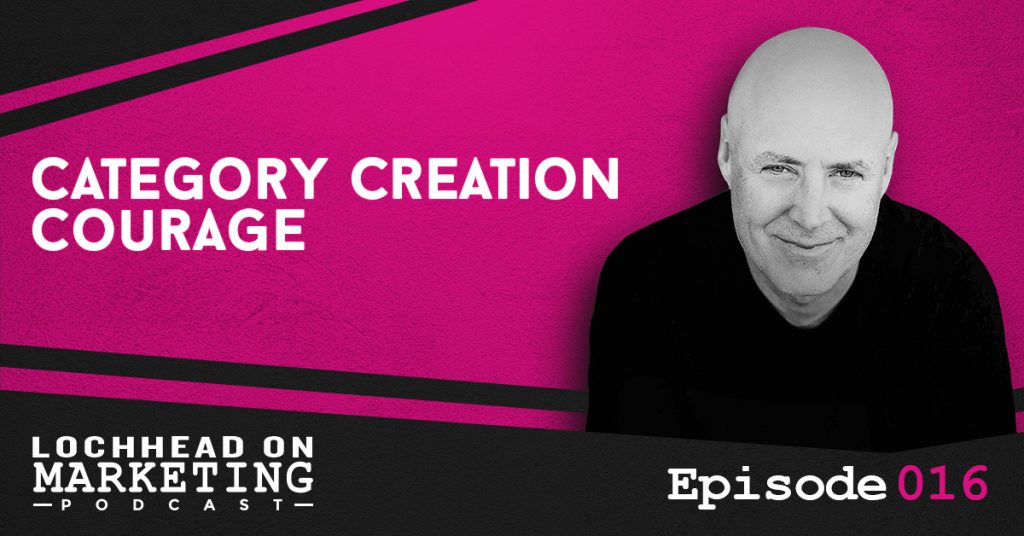
Podcast (lochheadonmarketing): Play in new window | Download (Duration: 8:20 — 7.7MB) | Embed
Subscribe: Apple Podcasts | Spotify | RSS | More
In today’s episode, Christopher Lochhead talks about why courage is a critical ingredient for legendary marketing and category design. He poses the question: “What does it take to make legendary marketing happen?” and he shares some except his book Niche Down to answer this.
Break From The Pack
What does it take to break from the pack? The pack, which usually means the general public, the people who think and does the same kind of marketing. What do we need to enable us to design a category and from then, execute to dominate that category?
On Christopher’s second book, Niche Down, co-writer Heather Clancy wrote some very important pointers in creating a category
“I hope you find it informative and inspiring as it relates to summoning the courage to actually do something legendary, design and dominate a category.” – Christopher Lochhead
Excerpts from Niche Down
Heather Clancy wrote in the book:
Category design actually requires going against that pack mentality. Humans have a primordial need to feel safe in numbers. We get a lot of positive feedback from being the same as others. Our challenge to you is to break from the pack. Free the creative part, the innovative part,the legendary part of you — and let that part be different.
Our dream is that you harness the exponential power of what makes you different versus the incrementalism of just being better. Because it is being different that makes a difference. And we know how tough that can be.
“Kermit The Frog” famously sang: “It’s not easy being green.”
Bill Walton, the NBA legend commiserates: “In life, things go wrong. In life, things collapse….People try to drag you down and people try to say ‘No’ to you.”
He goes on to posit, “I want to live in a world of ‘Yes’.” Of course, there will be a lot of “losery” along the way. To be legendary is to be ready for setbacks, disappointments and failures.
Because shit happens. Sometimes, life can be crushing. We’ve both been crushed more times than we can count. It’s okay to be a loser.
We all are. Failure is our teacher. Failure is our friend. Failure is our coach. Failure gives us humility. Failure gives us grit. Failure gives us a foundation. Losing is an essential ingredient for being legendary. Every time we lose we have a choice.
Give up.
Or, take the loss head on, learn from it and execute like a badass legend.
It Takes Courage to be Legendary
What Heather and Christopher are trying to communicate is the “emotional or psychological” barrier in doing legendary marketing. To put it simply, it takes a lot of courage to be legendary. Courage is moving forward in pursuing your plans, even though a lot of evidence states it won’t work.
Christopher cited his other podcast, Follow Your Different as an example. Regardless of what the experts in the podcasting industry were telling him — that business people will not listen to a long-form, unedited conversation podcast — FYD has become a top 200 overall charting podcast in the United States.
“If you believe in the problem you’re solving and you believe in your vision, then go with it. Be different, stick to it and have the courage to be legendary and execute like a badass legend.” – Christopher Lochhead
To hear more about Category Creation Courage and more relevant information from Christopher Lochhead, download and listen to the episode.
Bio:
Christopher Lochhead is a Top 25 podcaster and #1 Amazon bestselling co-author of books: Niche Down and Play Bigger.
He has been an advisor to over 50 venture-backed startups; a former three-time Silicon Valley public company CMO and an entrepreneur.
Furthermore, he has been called “one of the best minds in marketing” by The Marketing Journal, a “Human Exclamation Point” by Fast Company, a “quasar” by NBA legend Bill Walton and “off-putting to some” by The Economist.
In addition, he served as a chief marketing officer of software juggernaut Mercury Interactive. Hewlett-Packard acquired the company in 2006, for $4.5 billion.
He also co-founded the marketing consulting firm LOCHHEAD; was the founding CMO of Internet consulting firm Scient, and served as head of marketing at the CRM software firm Vantive.
Links:
Niche Down: Become Legendary Different
We hope you enjoyed this episode of Lochhead on Marketing™! Christopher loves hearing from his listeners. Feel free to email him, connect on Facebook, Twitter, Instagram and subscribe on iTunes!
015 Product-Market Fit Is A Dangerous Idea
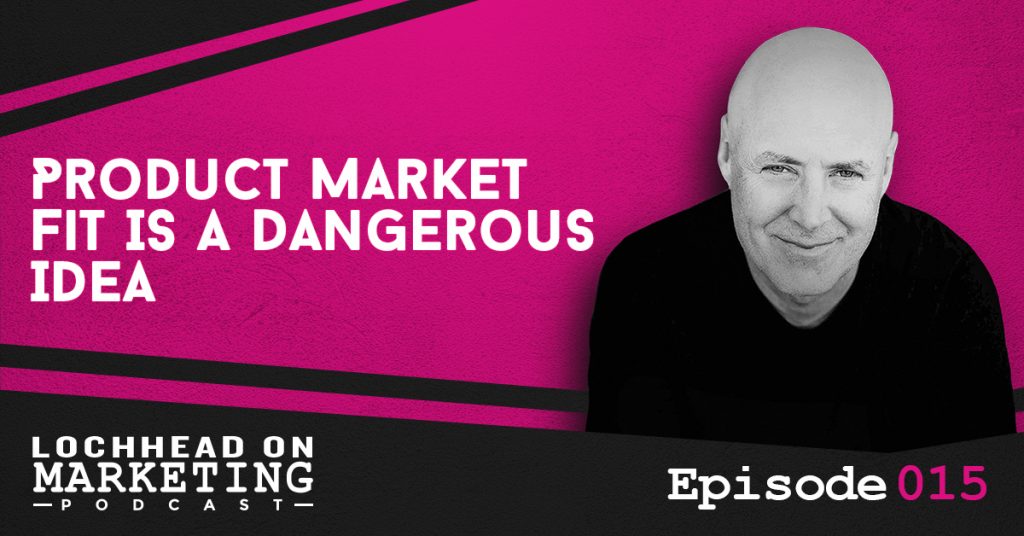
Podcast (lochheadonmarketing): Play in new window | Download (Duration: 12:51 — 20.7MB) | Embed
Subscribe: Apple Podcasts | Spotify | RSS | More
In most industries, product-market fit is an unquestioned gospel, even in Silicon Valley. On the contrary, Christopher believes that product-market fit is a dangerous idea. Why? Because legendary marketers create and design their own category, as opposed to competing in an existing category.
Product-Market Fit
In the tech startup world, achieving product-market fit is often considered a major milestone. However, Christopher argues that product-market fit is one of the most dangerous ideas in business today.
“The problem with product-market fit is that language can trick marketers into thinking that what you’re doing is building a product and you’re trying to fit it in a market.” – Christopher Lochhead
Legendary creators are not looking to “fit” into a market, instead, they want to stand out. Standing out means to design their own market category.
Category King and Queens
Christopher cites some of the category kings and queens of today. Think about Jeff Bezos, he is equated with the term eCommerce, just as we equate Pablo Picasso with Cubism. We also have Sara Blakely of Spanx, who created her own category of Shapeware, not just trying to fit into the girdle category.
“Think about the most respected entrepreneurs, creators, and innovators. a huge part of why we all respect them is because they broke or took new ground.” – Christopher Lochhead
Some other great examples are AirBNB, which presented a new idea and experience for tourists and travelers. Another one is Evian, who deviated from the idea that water is free. Red Bull also dominated their energy drink category, as opposed to hydration drinks, where Gatorade was category king.
“The greatest innovators teach the world to think differently. With a fresh idea, a new take on an old problem or by solving a problem we didn’t even know we had.” – Christopher Lochhead
Where the Challenge Lies
The challenge of product-market fit is, it can trap inventors and creators into thinking that they can test their product and service to people and f they consume it, they equate it to the future success of the product. If these people do not consume the product intuitively, then they can just go back and work on the product.
This is in opposition to Henry Ford’s mindset who said: “If I had asked people what they wanted, they would have said faster horses.” Moreover, even Steve Jobs has the same ideas on product-market fit, saying “customers don’t know what they want until we’ve shown them.”
“The big ah-ha here is that there is a massive distinction between fitting into an existing market category and competing versus creating your own new market category.” – Christopher Lochhead
To hear more about why Product-Market Fit Is A Dangerous Idea and more relevant information from Christopher Lochhead, download and listen to the episode.
Bio:
Christopher Lochhead is a Top 25 podcaster and #1 Amazon bestselling co-author of books: Niche Down and Play Bigger.
He has been an advisor to over 50 venture-backed startups; a former three-time Silicon Valley public company CMO and an entrepreneur.
Furthermore, he has been called “one of the best minds in marketing” by The Marketing Journal, a “Human Exclamation Point” by Fast Company, a “quasar” by NBA legend Bill Walton and “off-putting to some” by The Economist.
In addition, he served as a chief marketing officer of software juggernaut Mercury Interactive. Hewlett-Packard acquired the company in 2006, for $4.5 billion.
He also co-founded the marketing consulting firm LOCHHEAD; was the founding CMO of Internet consulting firm Scient, and served as head of marketing at the CRM software firm Vantive.
Links:
Quora: How do you define Product-Market Fit?
We hope you enjoyed this episode of Lochhead on Marketing™! Christopher loves hearing from his listeners. Feel free to email him, connect on Facebook, Twitter, Instagram and subscribe on iTunes!
014 Don’t Take My Word For It
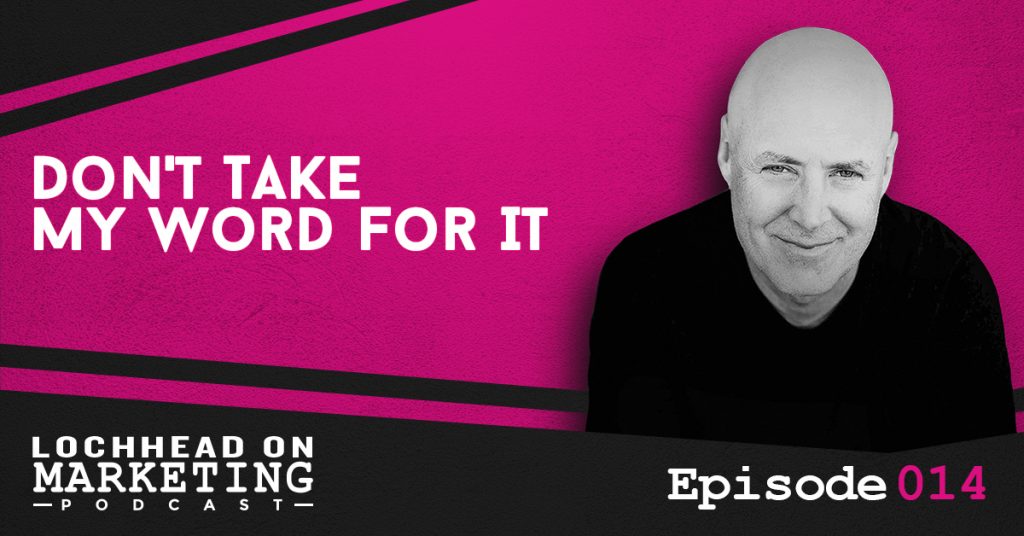
Podcast (lochheadonmarketing): Play in new window | Download (Duration: 14:34 — 23.4MB) | Embed
Subscribe: Apple Podcasts | Spotify | RSS | More
In this episode, Christopher Lochhead talks about how marketers strategically use language. Legendary marketers create a new language that educates the world on how they want their product or service perceived. Customer’s adaptation to that language is also a great tool to measure success.
How People Perceive Us
Christopher recently had Lee Hartley Carter on Follow Your Different Episode 099. Lee and her firm specialize in language strategy. We can infer that marketers pay very close attention to the use of words.
Christopher reminds us that the usage of some phrases undermines a person’s credibility. Some examples include phrases such as “don’t take my word for it” or “let me be honest with you.”
“Legendary Marketers and Category Designers know that a demarcation point in language creates a demarcation point in thinking, which creates a demarcation in action, usage, and consumption.” – Christopher Lochhead
Create New, Powerful Language
Christopher discusses how legendary marketers use language to create new thinking that educates the world. This language teaches customers what they do, why it matters and how to value it.
Some important examples are Starbucks and their “Double Grande Latte” instead of medium coffee. Another one is selling “pre-owned vehicles” versus “used cars.” Moreover, cloud-based software benefitted greatly with the usage of “on-premise software”
Indication of Success
It’s far too common to hear at almost every other coffee shop other than Starbucks — customers are asking for Grande or Frappe. Customers adapting to a new language is a great indication of success.
“You know you’re winning when customers start using your language, parrot them back to you, and they use it in the competitor’s stores.” – Christopher Lochhead
Christopher stresses Lee’s point, marketers need a language strategy! Category creators and designers create a new language to create a demarcation point in thinking, action, usage, and consumption.
To hear more about don’t take my word for it and more relevant information about language strategy from Christopher Lochhead, download and listen to the episode.
Bio:
Christopher Lochhead is a Top 25 podcaster and #1 Amazon bestselling co-author of books: Niche Down and Play Bigger.
He has been an advisor to over 50 venture-backed startups; a former three-time Silicon Valley public company CMO and an entrepreneur.
Furthermore, he has been called “one of the best minds in marketing” by The Marketing Journal, a “Human Exclamation Point” by Fast Company, a “quasar” by NBA legend Bill Walton and “off-putting to some” by The Economist.
In addition, he served as a chief marketing officer of software juggernaut Mercury Interactive. Hewlett-Packard acquired the company in 2006, for $4.5 billion.
He also co-founded the marketing consulting firm LOCHHEAD; was the founding CMO of Internet consulting firm Scient, and served as head of marketing at the CRM software firm Vantive.
Link:
We hope you enjoyed this episode of Lochhead on Marketing™! Christopher loves hearing from his listeners. Feel free to email him, connect on Facebook, Twitter, Instagram and subscribe on iTunes!
013 Committees Kill Legendary Marketing
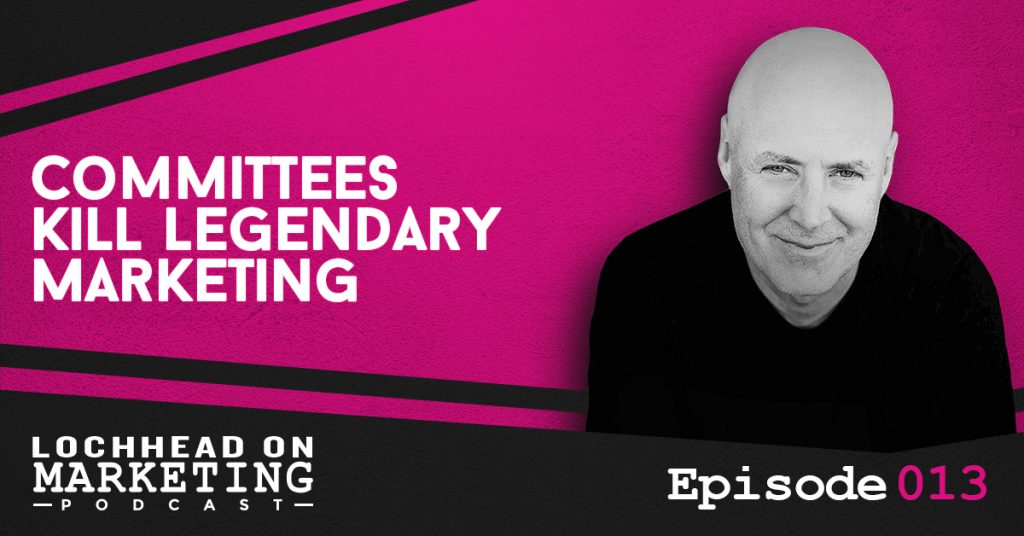
Podcast (lochheadonmarketing): Play in new window | Download (Duration: 12:30 — 11.5MB) | Embed
Subscribe: Apple Podcasts | Spotify | RSS | More
In today’s episode, Christopher gives us a rundown on why he thinks committees kill legendary marketing.
Why is so much marketing, shitty?
Christopher Lochhead candidly shares his honest observation on the industry today: a lot of marketing efforts suck. Aside from bad creatives, much of this onslaught of marketing stems from their inability to make a difference in designing and dominating a market category. Who’s to blame? Christopher says its the committees.
“This is probably true for most major initiatives in business, but it’s especially true in marketing because, fundamentally, legendary marketing is about leadership.” – Christopher Lochhead
To become the leader in your space — the category queen — a company must define and dominate a market niche. This not only holds true in tech companies but for almost all industries today. To dominate a market, every company’s objective should focus on building the company that wins, with a clear point of view on problem-solving.
The problem with committees
A famous automotive engineer and businessman, Charles Kettering, once said: “If you want to kill any idea in the world, get a committee working on it.” Why does committees hinder legendary marketing?
“The problem with most committees is that they are focused on process, not results.” – Christopher Lochhead
Committees generally try to incorporate everyone’s “feedback,” spend time “socializing ideas” and analyzing data. In the end, they are trying too hard to make everyone happy. Committees strive to be collaborative and ensure that all constituents have a say.
More issues with committees
A structural problem with many committees is that a lot of people can say no, while at the same time, they are not clear about who can say yes. By definition, if everybody agrees, that’s not a legendary idea.
“As a result, committees produce a compromise. They settle on the ideas that everyone could agree on. Not legendary ideas.” – Christopher Lochhead
Additionally, people involved in committees are oftentimes not subject matter experts themselves, which further leads to mediocre marketing efforts.
“It’s not about what people like, it’s about what’s gonna work. Particularly what’s gonna work through the lens. Will these help us design and dominate a giant category that matters and take 2/3 of the economics?” – Christopher Lochhead
To hear more about committees kill legendary marketing and more relevant information from Christopher Lochhead, download and listen to the episode.
Bio:
Christopher Lochhead is a Top 25 podcaster and #1 Amazon bestselling co-author of books: Niche Down and Play Bigger.
He has been an advisor to over 50 venture-backed startups; a former three-time Silicon Valley public company CMO and an entrepreneur.
Furthermore, he has been called “one of the best minds in marketing” by The Marketing Journal, a “Human Exclamation Point” by Fast Company, a “quasar” by NBA legend Bill Walton and “off-putting to some” by The Economist.
In addition, he served as a chief marketing officer of software juggernaut Mercury Interactive. Hewlett-Packard acquired the company in 2006, for $4.5 billion.
He also co-founded the marketing consulting firm LOCHHEAD; was the founder/CMO of Internet consulting firm Scient, and served as head of marketing at the CRM software firm Vantive.
Link:
We hope you enjoyed this episode of Lochhead on Marketing™! Christopher loves hearing from his listeners. Feel free to email him, connect on Facebook, Twitter, Instagram and subscribe on iTunes!
012 Category Creation Economics 101
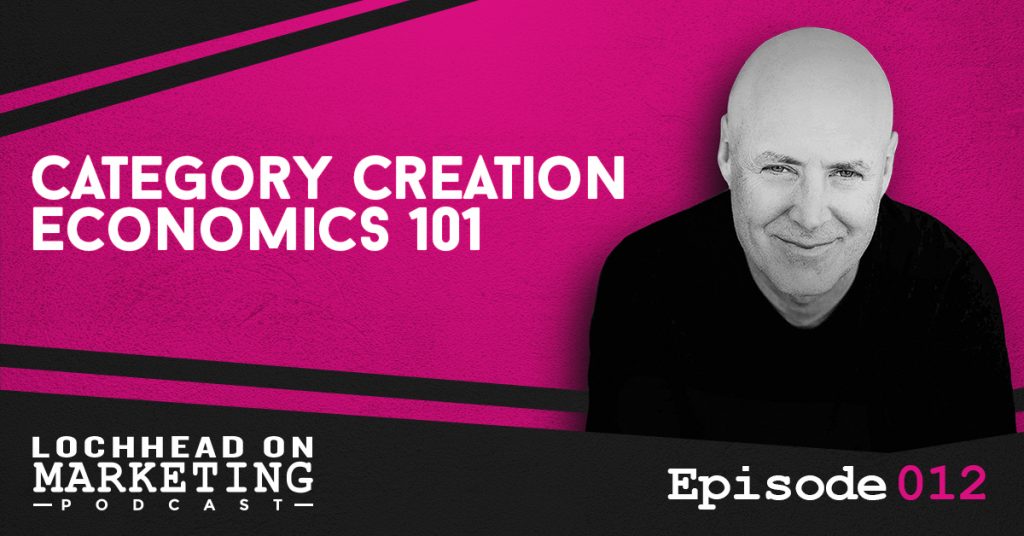
Podcast (lochheadonmarketing): Play in new window | Download (Duration: 14:30 — 13.4MB) | Embed
Subscribe: Apple Podcasts | Spotify | RSS | More
In this episode, Christopher Lochhead talks about the powerful, surprising winner-take-all realities of categories and why you want to be the category queen/king in your market. Christopher layout facts and data on category creation economics that you’ll find beneficial for your business, whether you’re in the tech industry or not.
Winner Takes All
In Christopher’s first book Play Bigger, they wrote about a research project they conducted on thousands of tech start-ups from 2000 to 2015, determining the market cap or valuation. Specifically, they wanted to know the percentage of the total value goes to the leader or category queen. In reality, one company gets 2/3 for the entire market category.
“The study shows that category queens earned 76 percent of the market capitalization of their entire market categories.” – Christopher Lochhead
Christopher’s good friend, Bob Evans said: “every company is a software company.” Tech company dynamics are now applicable to non-tech companies.
VCs “Me Too Strategy”
Christopher quoted a portion from his book Play Bigger. VCs oftentimes fall for the Me Too strategy where every firm would invest in some company in an emerging category, thinking it will succeed just like the first one who did.
“In Silicon Valley, we’ve watched venture capitalists (VCs) increasingly adopt a category king investment philosophy. Paul Martino of Bullpen Capital notes that VCs used to have a “me-too” strategy. If a start-up hit it big and opened up a hot new category, the many VC firms in Silicon Valley assumed that there was room for a lot of winners in that category.” – Christopher Lochhead, Play Bigger
Furthermore, Paul Martino tells us “it’s now apparent that one company wins big and dominates a healthy c0ategory, and the rest struggle, get acquired or perish. That means that as soon as one company appears to be the category king, the smart money competes to invest in that company, bidding up its value.”
Category Creation is the Ultimate Strategy
Christopher’s friend and category guru to Fortune 500 companies Eddie Yoon wrote for Harvard Business Review on the financial impacts of category creation.
He reported that “top 20 firms in Fortune‘s 2010 list of fastest-growing companies received $3.40 in incremental market capitalization for every $1.00 of revenue growth. Half the top 20 companies grew via category creation. Wall Street exponentially rewards the category creation companies, giving them $5.60 in incremental market capitalization for $1.00 in revenue growth.”
“No matter how you want to look at it, the bottom line is category kings take the vast majority of economics and are massively rewarded for becoming the category queen of the space.” – Christopher Lochhead
To hear more about the category creation economics 101 and more relevant information from Christopher Lochhead, download and listen to the episode.
Bio:
Christopher advised over 50 venture-backed startups. He is a Venture Capital Limited Partner and a former three-time Silicon Valley public company CMO, entrepreneur. In addition, he co-authored two bestsellers: Niche Down and Play Bigger.
After he flunked school, with few other options, Christopher started his first company at the age of 18.
He was a chief marketing officer of software juggernaut Mercury Interactive. Hewlett-Packard, in 2006, acquired that company for $4.5 billion.
Further, he also co-founded the marketing consulting firm LOCHHEAD. Christopher was the founder/CMO of Internet consulting firm Scient. He also served as head of marketing at the CRM software firm Vantive.
Christopher loves his family and friends. He thinks the Ramones are legendary and loves riding the mountains and waves of Northern California.
Links:
Category Creation Is the Ultimate Growth Strategy
Fortune‘s 2010 list of fastest-growing companies
We hope you enjoyed this episode of Lochhead on Marketing™! Christopher loves hearing from his listeners. Feel free to email him, connect on Facebook, Twitter, Instagram and subscribe on iTunes!
011 The Perception of Your Product is Your Product
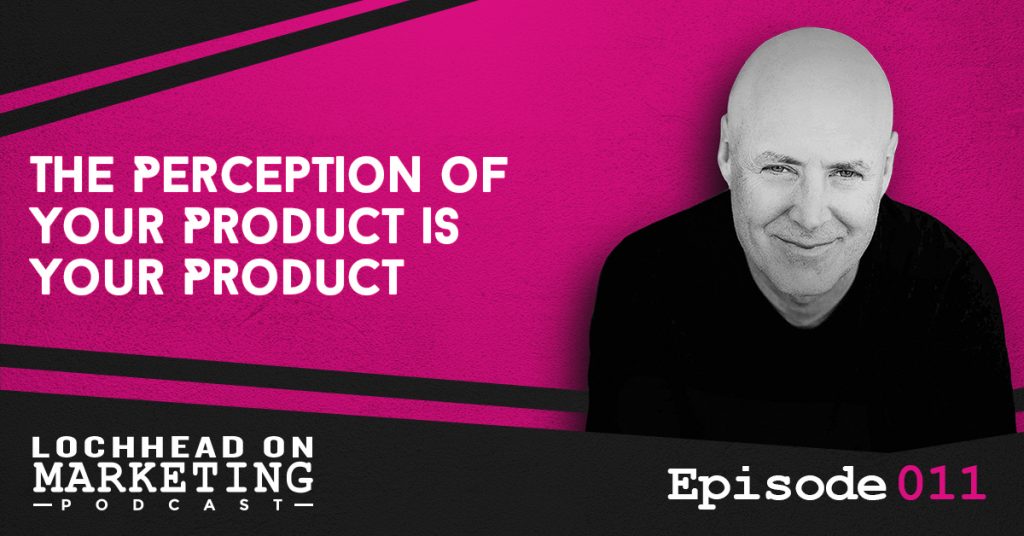
Podcast (lochheadonmarketing): Play in new window | Download (Duration: 9:13 — 8.5MB) | Embed
Subscribe: Apple Podcasts | Spotify | RSS | More
In this episode. Christopher Lochhead talks about what your real product or real service is. He discusses why product development and marketing should team because the perception of your product is your product.
Marketing Defined
One CEO, who is also a good friend of Christopher, once stated that “Marketing is what you do when you have a shitty product.” He was telling Christopher about their competitor who had a significantly inferior product but is, at that time, out-marketing them. Additionally, quite a lot of people in Silicon Valley also think this way.
Wikipedia defines marketing and product as such: “In marketing, a product is an object or system made available for consumer use; it is everything that can be offered to a market to satisfy the desire or need of a customer.”
“I actually don’t want to disagree with Wikipedia, but I do want to propose a different perspective. Your real product, your real service, is people’s perception of your product and service.” – Christopher Lochhead
The People’s Perception of Your Products
Christopher asserts that your product and service is not your product, but what people say it is, think it is and feel about it. He thinks that what other people say about the product or the service, is the truth, regardless if we think of it as true or not.
He cites examples such as Harley Davidson and Jack Daniels. These brands may not be the most efficient in performance or the most premium whiskey available, but they have made a mark in the minds and the hearts of consumers. In fact, they are considered category kings.
However, Christopher also cited instances when people’s perceptions of product change, such as that of Facebook and Boeing 737 MAX. They can fix their products but the perceptions will take forever to change.
The “Perception Manufacturing Business”
Christopher believes that we are in the “perception manufacturing business.” Further, he mentions that not only does the perception of the product more important than the product itself, but it is also actually what the developer is building when he builds and market the products.
“You don’t make products, you make perceptions about products. That is why legendary marketing is equally important to building legendary products.” – Christopher Lochhead
In conclusion, Christopher says that product engineering, product development, and marketing need to come together. They must realize that they are in the “perception manufacturing business.”
“It is ludicrous to say marketing is what you do when you have a shitty product. Marketing is what you do when you have a legendary product and you want people to perceive it as such.” – Christopher Lochhead
To hear more about the Perception of Your Product is Your Product and more relevant information from Christopher Lochhead, download and listen to the episode.
Bio:
Christopher advised over 50 venture-backed startups. He is a venture capital limited partner and a former three-time Silicon Valley public company CMO, entrepreneur. In addition, he co-authored two bestsellers: Niche Down and Play Bigger.
After he flunked school, with few other options, Christopher started his first company at the age of 18.
He was a chief marketing officer of software juggernaut Mercury Interactive. Hewlett-Packard, in 2006, acquired that company for $4.5 billion.
Further, he also co-founded the marketing consulting firm LOCHHEAD. Christopher was the founder/CMO of Internet consulting firm Scient. He also served as head of marketing at the CRM software firm Vantive.
Christopher loves his family and friends. He thinks the Ramones are legendary and loves riding the mountains and waves of Northern California.
We hope you enjoyed this episode of Lochhead on Marketing™! Christopher loves hearing from his listeners. Feel free to email him, connect on Facebook, Twitter, Instagram and subscribe on iTunes!
010 Artificial Intelligence In Marketing
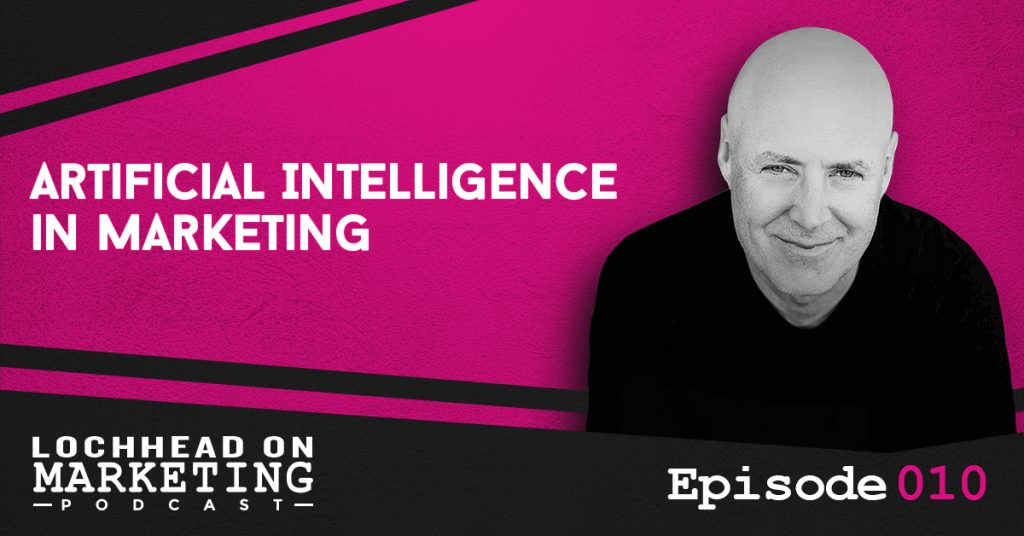
Podcast (lochheadonmarketing): Play in new window | Download (Duration: 12:51 — 11.8MB) | Embed
Subscribe: Apple Podcasts | Spotify | RSS | More
In this episode, Christopher Lochhead shares two eye-opening stories about Artificial Intelligence in Marketing. First is about Nike buying an AI marketing analytics company and second, Chase Bank using AI to write marketing copies. He further discusses how these two leverages technology to produce massive results.
Nike Acquires AI Startup
Tech Crunch reported that Nike announced its acquisition of the Boston-area startup Celect. This is to help Nike beef up its predictive analytics strengths. The startup’s tech focuses on delivering data insights based on structured and unstructured retail data.
“What we do know is Nike spent a lot of money to get their hands on a company that specializes in crunching a shit ton of data, of many thousands of customers, to anticipate their needs going forward.” – Christopher Lochhead
Christopher noted that this move of a giant brand has never happened in the past. In conclusion, this proves that analytics plays a huge role in Marketing. AI provides marketers data on customer’s wants and needs — even before they do.
“What kind of big data analytics and AI are we using to understand our market categories and what might we do in this area?” – Christopher Lochhead
AI Machines Outperforming Humans
AdAge published an experiment that they conducted about the bank company Chase. They compared the advertising copies written by humans versus that of AI technology. The result is: AI outperformed humans — with higher consumers clicking on the copy written by an AI machine.
“The folks at Chase Bank entered a five-year agreement with this company Persado to use machine learning to write their ad copy.” – Christopher Lochhead
The Implications of AI Marketing
Legendary marketers should always be experimenting with both the art and the science of marketing.
“We’re gonna see more companies benchmarking the two — whether ad headlines and copy, logo design and a lot of other creative things. What many of us in marketing thought technology wouldn’t touch — are now being touch by that.” – Christopher Lochhead
As the lines of Science and Art blur, Christopher calls out to fellow Creative professionals to stay in tune with technology. Never be complacent about our jobs because AI is coming to replace everything. The best action to do at the moment is to leverage this technology and not to resist it.
“Leverage the science and be super strategically creative at the same time.” – Christopher Lochhead
To hear more about Artificial Intelligence Marketing and more relevant information from Christopher Lochhead, download and listen to the episode.
Bio:
Christopher advised over 50 venture-backed startups. He is a venture capital limited partner and a former three-time Silicon Valley public company CMO, entrepreneur. In addition, he co-authored two bestsellers: Niche Down and Play Bigger.
After he flunked school, with few other options, Christopher started his first company at the age of 18.
He was a chief marketing officer of software juggernaut Mercury Interactive. Hewlett-Packard, in 2006, acquired that company for $4.5 billion.
Further, he also co-founded the marketing consulting firm LOCHHEAD. Christopher was the founder/CMO of Internet consulting firm Scient. He also served as head of marketing at the CRM software firm Vantive.
Christopher loves his family and friends. He thinks the Ramones are legendary and loves riding the mountains and waves of Northern California.
Link:
Nike buys an AI startup that predicts what consumers want
Chase Commits To Ai After Machines Outperform Humans In Copywriting Trials
We hope you enjoyed this episode of Lochhead on Marketing™! Christopher loves hearing from his listeners. Feel free to email him, connect on Facebook, Twitter, Instagram and subscribe on iTunes!
009 Marketing Strategy vs. Tactics
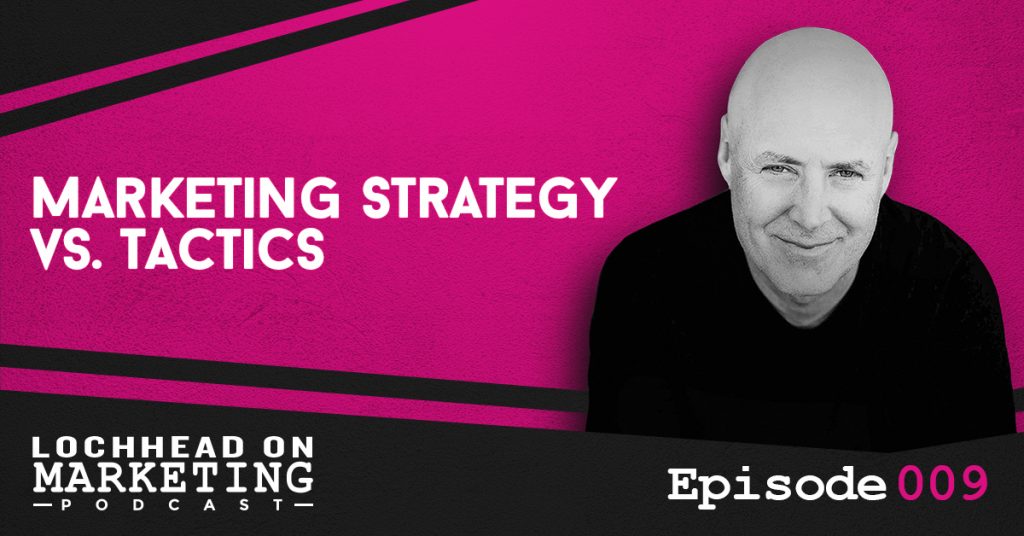
Podcast (lochheadonmarketing): Play in new window | Download (Duration: 4:40 — 4.3MB) | Embed
Subscribe: Apple Podcasts | Spotify | RSS | More
The difference between Marketing Strategy and Tactics, oftentimes, confuses most people. In this episode of Lochhead on Marketing, Christopher Lochhead talks about some of the pressing questions people have on strategy and tactics.
Quoting Dushka Zappata
A good friend of Lochhead, Senior Communication and PR Executive Dushka Zappata helps shine a light on this confusion marketers have about strategy and tactics. She has 20 years experience in the tech industry and she amassed 140 million views in Q&A site Quora with her writing.
Strategy
Dushka Zappata answered the distinction between strategy and tactics. According to her, strategy answers the question “why?” To give an example for this, one may ask, “why are we doing this, why do we think it’s a good idea?”
“For strategy, the answer should be a blend of data, understanding of trends and creativity.” – Dushka Zappata
Tactics
She further continued that tactics, on the other hand, answers the question “how.” This pertains to questions such as, “how will we get this done,” “what are the actions needed” and “what will get executed.”
Working on your marketing strategy and tactics need not be confusing. To be clear, strategy answers, “why,” and tactics answers, “how.”
To hear more about Marketing Strategy vs. Tactics and more relevant information from Christopher Lochhead, download and listen to the episode.
Bio:
Christopher Lochhead is a Top 25 podcaster and #1 Amazon bestselling co-author of books: Niche Down and Play Bigger.
He has been an advisor to over 50 venture-backed startups; a former three-time Silicon Valley public company CMO and an entrepreneur.
Furthermore, he has been called “one of the best minds in marketing” by The Marketing Journal, a “Human Exclamation Point” by Fast Company, a “quasar” by NBA legend Bill Walton and “off-putting to some” by The Economist.
In addition, he served as a chief marketing officer of software juggernaut Mercury Interactive. Hewlett-Packard acquired the company in 2006, for $4.5 billion.
He also co-founded the marketing consulting firm LOCHHEAD; was the founding CMO of Internet consulting firm Scient, and served as head of marketing at the CRM software firm Vantive.
Link:
We hope you enjoyed this episode of Lochhead on Marketing™! Christopher loves hearing from his listeners. Feel free to email him, connect on Facebook, Twitter, Instagram and subscribe on iTunes!
008 7 Recession Marketing Ideas
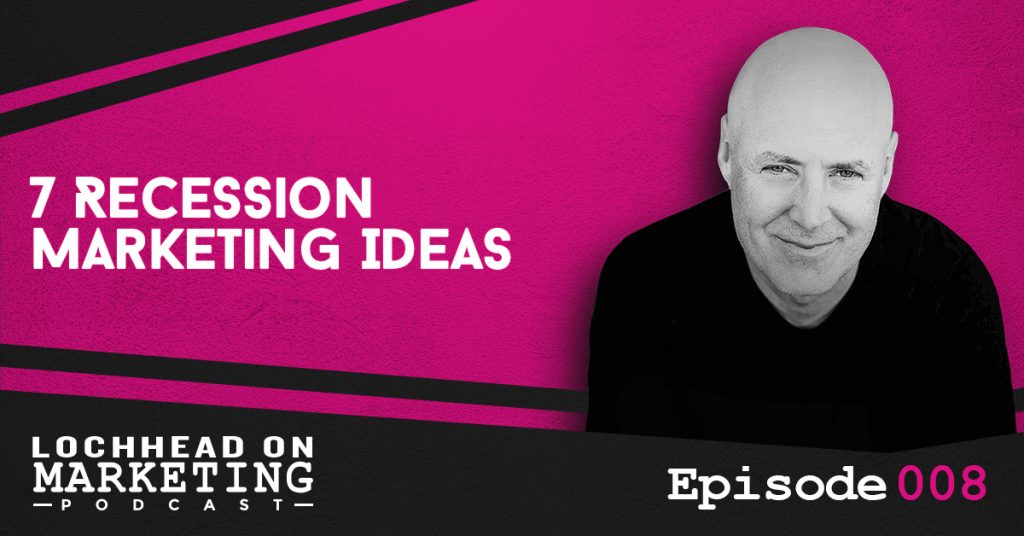
Podcast (lochheadonmarketing): Play in new window | Download (Duration: 20:45 — 19.1MB) | Embed
Subscribe: Apple Podcasts | Spotify | RSS | More
Christopher Lochhead discusses some of his marketing ideas timely for a potential (we hope not, but economists say otherwise) recession. Here are 7 recession marketing ideas for our listeners that you might want to consider for your business.
1. Never Let A Good Recession Go To Waste!
History proved that recessions are the impetus for change. With change comes both threats and opportunities. Ordinary business people usually panic and focus on threats. However, legendary marketers focus on both. Recessions are a great excuse for taking action, especially those that should have been taken anyway.
“Get on your recession planning now! Do not wait for the recession to happen. Get on it, regardless of whether or not we’re going to have a recession. They are great excuse to tighten up shit on your ship!” – Christopher Lochhead
2. Assume you can’t raise any more money
Recession talks are best paired with the assumption that there is no money available for lending — no more VCs, bank loans, operating lines or rich uncles. If you do raise equity or debt, expect that your valuation or market cap is likely coming down, so you will have to give up more equity to raise VC. Likewise your costs to service loans or operating lines is going up.
“Focus on your cash and remember that paying customers are your best VCs, your best bankers.” – Christopher Lochhead
3, Measure twice, cut once
Go through your marketing plans and budget with a magnifying glass. Christopher advises to categorize every single investment — either one time or on-going investments — into three buckets: must do, good to do, nice to do.
“Do not have more than a 3rd of your investments in ‘Must Do.’ Find at least 10% of your investments that you can cut now. If you want to get aggressive, find 25%. Plan to cut or re-deploy at least 5%, no matter what happens – recession or not.” – Christopher Lochhead
4. Brainstorm short-term ways to increase revenue
Come up with some packages or offerings you can promote to your best customers now. Brainstorm around 25 ideas on how to increase revenue immediately. Ideas that aims to provide customers with an incentive to buy more from you right now are the key to this before they start cutting back spending hard.
5. Market & Sell Into The Whitespace
Get a list of all of your existing customers and figure out which customers, own / use which of your products and services. This is to identify the white space or which customers are not users of all of your offerings.
6. Consider a competitor trade-in.
Recessions are a unique opportunity to destroy your completion.
7. Double Down on Your Category
This is an area you should focus on a recession. Chances are, most of your competition is going to panic and they most likely will over-cut marketing. Take advantage of the lower cost of marketing and go hard on content marketing, especially in social media.
“Your prospects and customers will be hearing less noise. Take advantage of this, to evangelize your category point-of-view. Become more visible, while your competition is hiding under a desk, asking for their mommies.” – Christopher Lochhead
Bio:
Christopher Lochhead is a Top 25 podcaster and #1 Amazon bestselling co-author of books: Niche Down and Play Bigger.
He has been an advisor to over 50 venture-backed startups; a former three-time Silicon Valley public company CMO and an entrepreneur.
Furthermore, he has been called “one of the best minds in marketing” by The Marketing Journal, a “Human Exclamation Point” by Fast Company, a “quasar” by NBA legend Bill Walton and “off-putting to some” by The Economist.
In addition, he served as a chief marketing officer of software juggernaut Mercury Interactive — which was acquired by Hewlett-Packard in 2006 for $4.5 billion.
He also co-founded the marketing consulting firm LOCHHEAD; was the founding CMO of Internet consulting firm Scient, and served as head of marketing at the CRM software firm Vantive.
Link:
We hope you enjoyed this episode of Lochhead on Marketing™! Christopher loves hearing from his listeners. Feel free to email him, connect on Facebook, Twitter, Instagram and subscribe on iTunes!

